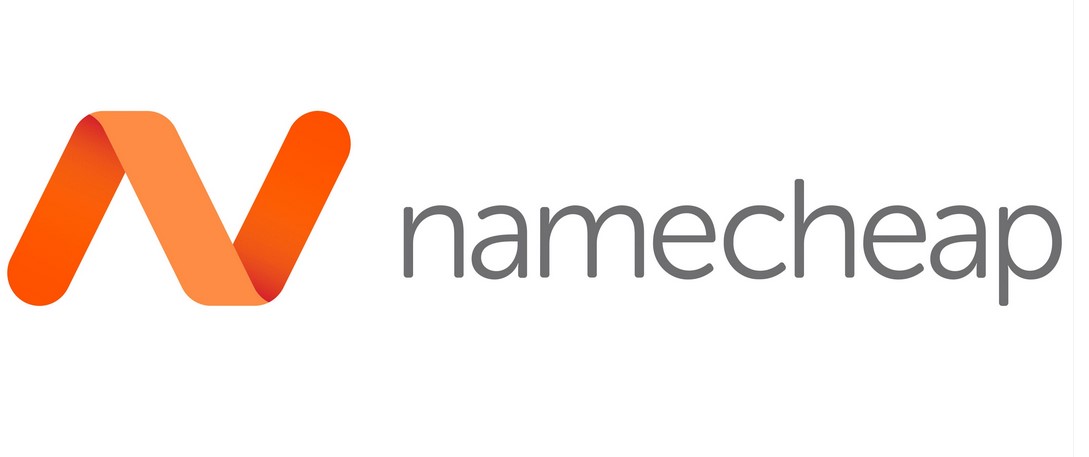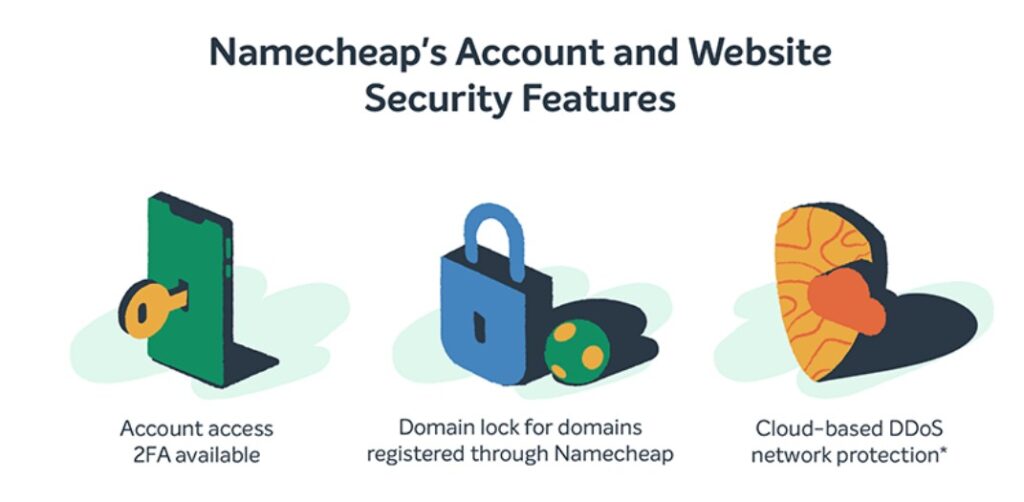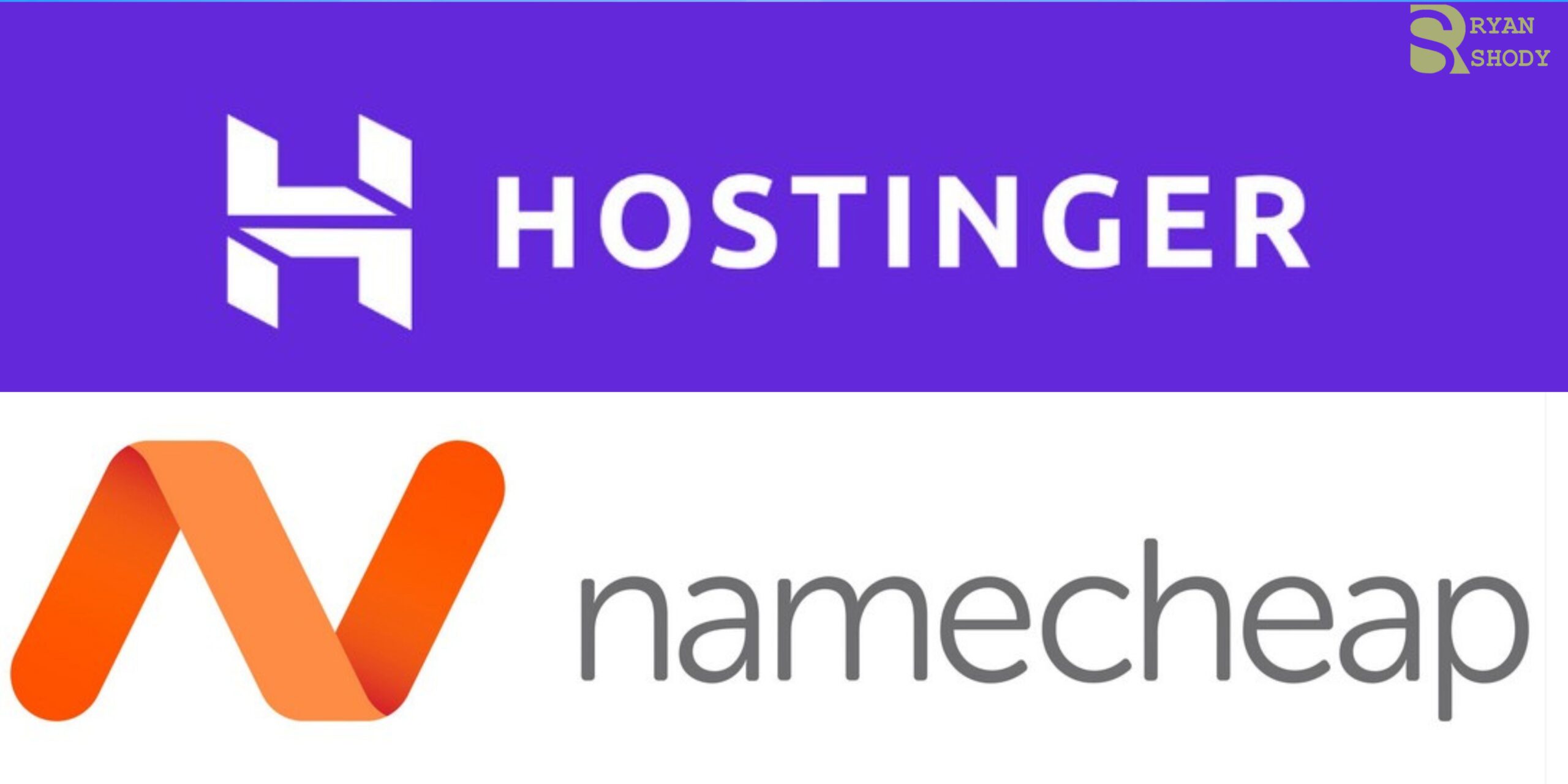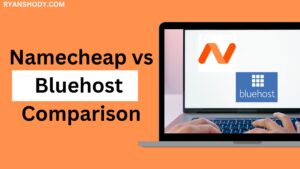When deciding between Hostinger vs Namecheap, it’s essential to understand how each budget-friendly web hosting provider stacks up.
Our Top Pick

“RyanShody’s #1 Pick: Hostinger ”
1.Plans from just $2.99/month — affordable power.
2. Free domain & SSL to kickstart your site.
3. 24/7 expert support at your fingertips.
Both offer unique strengths and cater to different needs, but which one truly offers the best value in 2025?
Namecheap – Best for Affordable Web Solutions

Ryanshody’s Pick for Budget-Friendly Growth
- Reliable domains and lightning-fast web services
- Affordable plans for beginners and businesses alike
- Free privacy protection and easy management tools
In this comparison, we’ll dive into their features, pricing, and performance to help you make an informed decision.
Quick Comparison
When it comes to choosing between Hostinger vs Namecheap, the decision can be challenging due to the strengths of both providers.
Hostinger vs Namecheap both offer exceptional value, but they cater to slightly different needs.

Hostinger is often recommended for those who seek a balance between affordability and performance, making it ideal for startups and small businesses.

On the other hand, Namecheap is known for its straightforward domain registration services and affordable hosting plans, making it a top choice for users who prioritize cost-effectiveness and simplicity.
In this quick comparison of Hostinger vs Namecheap, Hostinger stands out for its feature-rich plans and superior performance.
However, if you’re looking for the most budget-friendly option with reliable basic features, Namecheap might be worth considering.
Ultimately, the best choice depends on your specific needs and budget.
| Comparison | Hostinger | Namecheap |
|---|---|---|
| Ease of Use | User-friendly, ideal for those on a budget | Simple interface, best for basic needs |
| Performance | Solid performance, LiteSpeed technology | Reliable uptime, but slightly lower performance |
| Customer Support | 24/7 support via chat, multilingual support available | 24/7 support, but response times may vary |
| Pricing | Extremely affordable, especially for long-term plans | Very competitive pricing, especially for domains |
| Security | Basic security features, free SSL, Cloudflare included | Standard security, free SSL, no advanced features |
| Uptime | 99.9% uptime guarantee, focus on speed | 99.9% uptime guarantee, consistent but not exceptional |
| Scalability | Best for small to medium-sized websites | Better for simple, low-traffic sites |
| Control Panel | hPanel, easy to navigate | cPanel, familiar and simple to use |
| WordPress Integration | One-click installs, optimized for speed | Easy WordPress setup, basic features |
Feature Comparison: Hostinger vs Namecheap
When choosing a budget web hosting provider, the features offered by each company play a critical role in making an informed decision.
In this section, we delve into a detailed comparison of the features of Hostinger vs Namecheap.
Known for its affordability and performance, Hostinger is a popular choice among startups and small businesses.
On the other hand, Namecheap is recognized for its cost-effective domain registration services and straightforward hosting plans, making it a top pick for users who prioritize simplicity and value.
This Hostinger vs Namecheap features comparison is designed to help you evaluate the strengths and weaknesses of each provider, ensuring you choose the one that best meets your web hosting needs.
Hostinger Features:

- Performance: Delivers solid performance with LiteSpeed technology, ensuring faster load times and reliable uptime.
- User Interface: Offers an intuitive hPanel, making site management easy, even for beginners.
- WordPress Integration: One-click WordPress installation with optimized speed and security.
- Domain Registration: Free domain registration for the first year, reducing initial costs.
- Email Hosting: Includes free email hosting with all plans, ideal for small businesses.
- Security: Basic security features, including free SSL, Cloudflare integration, and regular updates.
- Customer Support: 24/7 multilingual support via chat, with responsive and helpful assistance.
Namecheap Features:

- Performance: Reliable performance with a focus on consistent uptime, though slightly less advanced than Hostinger.
- User Interface: Simple and straightforward cPanel, suitable for those who prefer a familiar interface.
- WordPress Integration: Easy WordPress setup with basic features, great for straightforward needs.
- Domain Services: Affordable domain registration, with competitive pricing for renewals.
- Email Hosting: Provides free professional email accounts, although with fewer features than Hostinger.
- Security: Standard security features, including free SSL, but lacks advanced options.
- Customer Support: 24/7 support available, though response times can vary.
By comparing Hostinger vs Namecheap, it’s evident that both providers have unique strengths.
Hostinger is ideal for those seeking a budget-friendly solution with better performance and advanced features, while Namecheap offers excellent value for basic needs, especially in domain registration and straightforward hosting plans.
Personal Experience with Hostinger vs Namecheap
Navigating the world of budget hosting, my experience with Hostinger and Namecheap offered distinct advantages, each catering to different needs.
Hostinger stood out with its performance and feature-rich plans, making it an excellent choice for those who want more from a budget provider.

The ease of use with hPanel and the seamless integration with WordPress simplified the website setup process, which is crucial for startups and small businesses.
On the other hand, Namecheap impressed with its straightforward approach and unbeatable domain registration services.

The simplicity of their cPanel made it easy to manage websites, particularly for those who prefer a no-frills hosting experience.
In comparing Hostinger vs Namecheap, it’s clear that both have unique strengths: Hostinger excels in performance and features, making it ideal for those who need more from their hosting provider.
while Namecheap is best for those looking for a simple, cost-effective solution without unnecessary extras.
Pricing and Plans (Hostinger vs Namecheap)
When considering a budget hosting provider, pricing and plans are often the deciding factors.
In this comparison of Hostinger vs Namecheap, we’ll explore the different pricing structures and plans offered by each, giving you a clearer picture of what you can expect in terms of cost and value.
Hostinger offers a range of pricing plans designed to meet different needs and budgets.
From basic shared hosting to more advanced options like VPS and cloud hosting, Hostinger’s plans cater to a variety of users.
Namecheap, on the other hand, is renowned for its affordability.
It provides an array of budget-friendly plans, making it an attractive option for those just starting out or operating on a tight budget.
Comparison Table of Pricing and Plans:
| Plan Type | Hostinger Price | Namecheap Price |
|---|---|---|
| Basic Shared Hosting | $1.99 – $3.99/month | $1.58 – $4.48/month |
| WordPress Hosting | $1.99 – $6.99/month | $3.88 – $11.88/month |
| VPS Hosting | $3.95 – $77.99/month | $11.88 – $19.88/month |
| Cloud Hosting | $9.99 – $69.99/month | Not offered |
| Domain Registration | From $8.99/year | From $8.88/year |
| Email Hosting | Free with hosting plan | Free with hosting plan |
Both Hostinger vs Namecheap offer competitive pricing in their respective domains.
While Hostinger provides a more comprehensive range of services, particularly for those needing scalable hosting solutions, Namecheap stands out for its budget-friendly plans, especially for those new to website hosting.
Pros & Cons of Hostinger vs Namecheap
Understanding the advantages and disadvantages of web hosting services is crucial for making an informed decision.
In this section, we’ll delve into the pros and cons of Hostinger vs Namecheap.
Each service has its unique strengths and weaknesses, and comparing them can help you determine which one aligns best with your hosting needs.
Pros of Hostinger:
- Affordable Pricing: Extremely budget-friendly, especially for long-term commitments.
- Performance: Strong performance with LiteSpeed servers and solid uptime.
- User Interface: hPanel is easy to use, even for beginners.
- Security Features: Includes free SSL, Cloudflare integration, and regular backups.
- Customer Support: 24/7 multilingual support, responsive and helpful.
- WordPress Integration: Seamless integration with one-click installations.
- Scalability: Offers scalable plans from shared to cloud hosting.
Cons of Hostinger:
- Limited Features on Basic Plans: Basic plans offer fewer resources and features.
- No Dedicated Hosting: Lack of dedicated hosting options may limit high-traffic websites.
- Renewal Rates: Prices increase after the initial term.
Pros of Namecheap:
- Affordable Pricing: Competitive pricing, particularly attractive for new users.
- Domain Registration: Cost-effective domain services with free privacy protection.
- User Interface: Simple cPanel, easy to navigate.
- Good Uptime: Reliable uptime for most websites.
- Free Domain: Offers a free domain name with select hosting plans.
- Email Hosting: Includes free email hosting with all plans.
- Money-Back Guarantee: 30-day refund policy for hosting services.
Cons of Namecheap:
- Performance Variability: Speeds can fluctuate, especially under high traffic.
- Limited Advanced Features: Fewer options for advanced or high-traffic sites.
- Support: Customer support is available 24/7, but response times can vary.
Alternatives to Hostinger vs Namecheap
When comparing Hostinger vs Namecheap, it’s evident that Hostinger excels in performance, scalability, and feature-rich plans, making it ideal for those seeking robust hosting solutions.
Namecheap, however, stands out for its affordability and simplicity, appealing to users who are budget-conscious or new to website hosting.

In the dynamic web hosting market, considering alternatives to popular services like Hostinger and Namecheap is crucial for making a well-informed decision.
For those exploring budget-friendly hosting solutions, it’s important to review different options that might better align with their specific hosting needs.
This section will explore noteworthy alternatives to both Hostinger and Namecheap, assessing how they stack up in terms of hosting performance, customer service, and hosting packages.
Alternatives to Hostinger:
- Bluehost: Known for its beginner-friendly approach and reliable performance.
- SiteGround: Offers superior customer support and high-performance hosting.
- A2 Hosting: Excels in speed and reliability, with a focus on performance.
- DreamHost: Focused on privacy and user-friendly services.
- InMotion Hosting: Provides robust options for business-focused hosting solutions.
- GreenGeeks: An eco-friendly hosting option with consistent uptime.
- GoDaddy: Offers extensive domain management services and website builders.
Alternatives to Namecheap:
- iPage: Known for its budget-friendly shared hosting plans.
- Bluehost: A well-rounded option balancing features and affordability.
- SiteGround: Distinguished by its exceptional uptime and customer support.
- DreamHost: Prioritizes privacy and ease of use.
- HostGator: Provides flexible plans with great scalability options.
- WPEngine: Ideal for managed WordPress hosting with advanced features.
- HostPapa: Tailored for small businesses with personalized support.
Exploring these alternatives to Hostinger and Namecheap offers insights into a range of web hosting options, each with unique selling points.
Whether you prioritize advanced features, specialized hosting types, or budget considerations, there’s a service out there to fulfill your web hosting requirements.
Other Relevant Categories in Comparison (Hostinger vs Namecheap)
When comparing Hostinger vs Namecheap, it’s also important to consider various other categories crucial in the decision-making process, such as eCommerce capabilities, website scalability, and additional services like email hosting and site migration.
Categories for Hostinger:
- Scalability: Offers scalable solutions from shared to cloud hosting.
- eCommerce Features: Solid support for WooCommerce hosting.
- Shared Hosting: Excellent for budget-conscious users.
- VPS Hosting: Provides flexible and affordable VPS hosting.
- Additional Services: Includes tools like website builders and free SSL.
- Performance: Known for fast loading speeds and uptime.
- WordPress Optimization: Optimized for speed and security in WordPress hosting.
Categories for Namecheap:
- Budget-Friendly Plans: Great for cost-conscious users.
- Ease of Use: Simple interface with cPanel for beginners.
- Domain Services: Extensive and affordable domain management.
- Security: Includes basic security solutions with SSL.
- Customer Support: 24/7 support, though less extensive than Hostinger.
- Performance: Reliable uptime, suitable for small to medium-sized sites.
- Email Hosting: Free email services included with hosting plans.
Conclusion/Summary: Who is the Winner?
After a comprehensive comparison, Hostinger emerges as the winner with a rating of 90%.
It excels in performance, scalability, and overall value, making it ideal for startups and small businesses seeking an affordable yet feature-rich hosting solution.
Namecheap also performs well with a rating of 85%, offering great affordability and ease of use, making it a solid choice for individuals and small-scale projects with simpler needs.
Winner: Hostinger
FAQ (Hostinger vs Namecheap)
FAQ 1: What are the main differences between Hostinger and Namecheap?
Answer: The main differences lie in their pricing, performance, and target audience. Hostinger offers more advanced features and better performance, making it ideal for businesses and websites that expect growth.
Namecheap, on the other hand, is more budget-friendly and provides a simpler interface, appealing to beginners and those with less demanding needs.
FAQ 2: Can I transfer my existing website from Namecheap to Hostinger, or vice versa?
Answer: Yes, both Hostinger and Namecheap support website transfers. Hostinger offers a guided migration service
While Namecheap provides instructions and support for transferring your site to their hosting. It’s important to check the specifics and possible costs associated with each service.
FAQ 3: Which hosting service is better for eCommerce websites?
Answer: Hostinger might be a better choice for eCommerce websites, particularly because of its optimized WooCommerce hosting and faster performance.
These features are crucial for running a smooth and reliable online store.
FAQ 4: How do Hostinger and Namecheap compare in terms of customer support?
Answer: Hostinger generally receives higher ratings for customer support, offering 24/7 assistance via chat and email with multilingual support.
Namecheap also provides 24/7 support, primarily through chat and email, but response times may vary.
FAQ 5: Are there any significant differences in security features between Hostinger and Namecheap?
Answer: Yes, there are differences. Hostinger offers more advanced security features like regular backups, free SSL, and Cloudflare integration.
Namecheap provides essential security features, including domain privacy and SSL certificates, but may lack the advanced options found with Hostinger.




